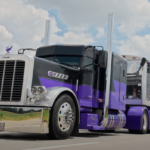On Tuesday, the U.S. House of Representatives voted with a margin of 221-203 to repeal the newly implemented emissions standards for heavy-duty trucks, which had been put in place by the Environmental Protection Agency (EPA). Last month, a similar rollback had narrowly passed in the Senate.
The legislation will now be presented to President Joe Biden, who is anticipated to veto it. Overriding the veto would necessitate a two-thirds majority in both the House and the Senate.
The House vote on Tuesday largely followed party lines, but there were some deviations. Four Democrats voted in favor of the rollback, while one Republican voted against it.
The new EPA standards, aimed at reducing various air pollutants such as nitrogen oxides, particulate matter, hydrocarbons, and carbon monoxide, faced opposition from major trucking industry organizations. Critics argue that the rules will substantially increase the cost of new trucks and perceive them as a way to pressure carriers into adopting vehicles powered by alternative fuels, particularly battery-electric vehicles.
In other legislative developments that took place on Tuesday, the House Transportation and Infrastructure Committee approved a significant bill to expand truck parking. The bill includes a budget of $755 million over three years for the purpose of increasing truck parking capacity. It now awaits consideration by the full House.
The bipartisan Truck Parking Safety Improvement Act, introduced by Representatives Mike Bost (R-Illinois) and Angie Craig (D-Minnesota), received praise from the Owner Operators Independent Drivers Association, a group representing independent truck drivers.
Senators Cynthia Lummis (R-Wyoming) and Mark Kelly (D-Arizona) have jointly introduced a companion legislation that is currently awaiting consideration by the Senate Committee on Environment and Public Works.
The proposed legislation outlines a funding mechanism for the addition of truck parking spaces. Under this framework, funding would be allocated through a competitive process, and interested parties would need to submit comprehensive proposals to the U.S. Department of Transportation. The main objective of the program would be to enhance parking capacity by constructing new truck parking facilities and transforming existing weigh stations and rest areas into functional parking spaces for truck drivers.
Also on Tuesday, the House Transportation and Infrastructure Committee approved several other bills including:
- one that would make permanent two DOT waivers that provide flexibility for the licensing of qualified new drivers. These waivers improve the application process for individuals seeking Commercial Driver’s Licenses by allowing skills test examiners to also administer the CDL knowledge test, and to administer a driving skills test to any applicant regardless of the applicants’ state of domicile or training.
- one that would provide a 10% weight tolerance specifically for stinger-steered automobile transporters.
- one that would allow a 10% weight tolerance for dry bulk carriers to allow for the shifting of cargo, in vehicles loaded at or below federal weight limits, during transit.
- one that would provide a 2,000-pound weight exemption to hydrogen-powered vehicles, similar to the exemption currently enjoyed by both battery-electric and natural gas-powered heavy-duty trucks.
All now go to the full House for consideration.





